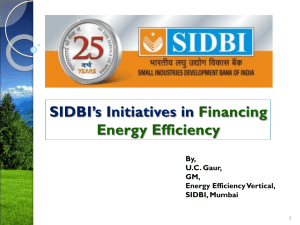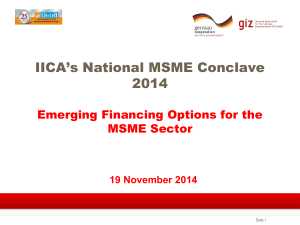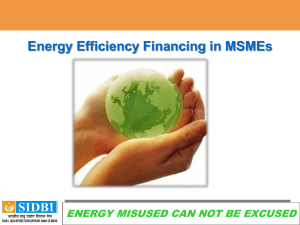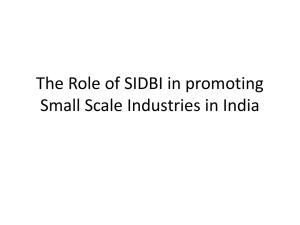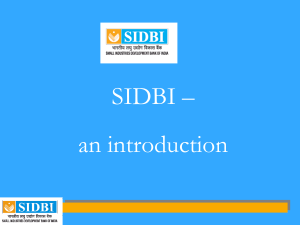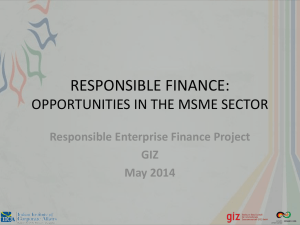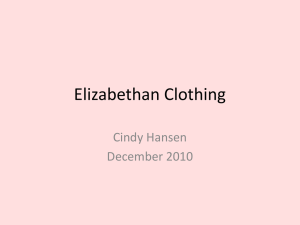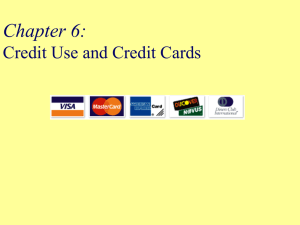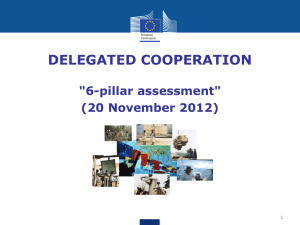go green with sidbi
advertisement
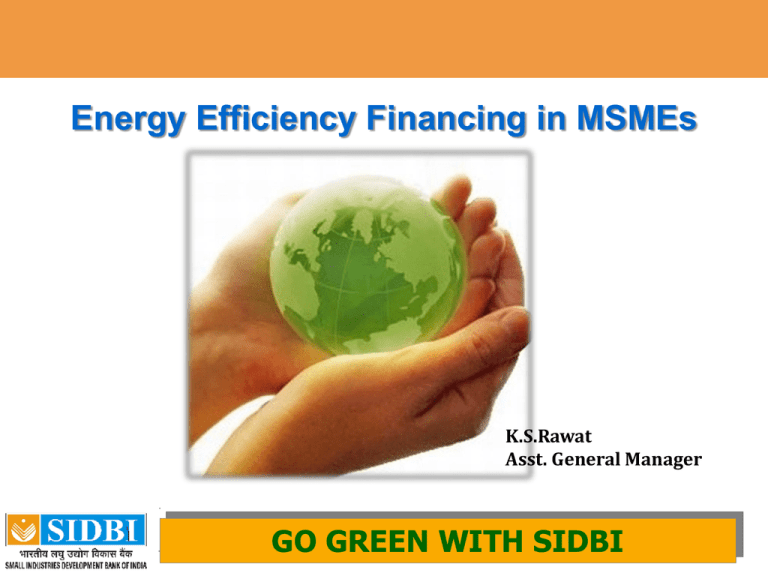
Energy Efficiency Financing in MSMEs K.S.Rawat Asst. General Manager GO GO GREEN WITH SIDBI AND GIZSIDBI GREEN WITH 1 An overview of India’s Enery Scenario vis a vis MSMEs India is the fourth-largest energy consumer in the world, after the United States, China, and Russia. MSME sector consumes almost half of the total energy consumption by industrial sector. Many MSMEs are highly energy inefficient. Energy cost, as also profits constitute 5% of total sales. Scope to reduce energy uses almost 25% Thus, EE can increase profit by 25%. GO GREEN WITH SIDBI 2 Issues and Constraints High energy consumption technology/processes Lack of awareness / information on Energy Efficiency (EE)/ EE best practices/EE technologies Inadequate focus on EE/ clean tech/ renewable energy financing by the banks Lack of sufficient expertise in banks to assess EE loans due to obsolete • Eg. ESCOs not taking off in India, but most successful in Europe GO GREEN WITH SIDBI 3 Energy Efficiency as a double strategy Efficiency gains directly influence profits Profit Resource cost Profit Resource cost GO GREEN WITH SIDBI 4 SIDBI – towards sustainable financing ACTIVITIES COVERED Energy Efficiency – equipments, green building Cleaner Production Waste Management –agro waste, industrial waste Fuel Switching- diesel/petrol to CNG/LPG, coal to oil/gas based furnace CDM- Jodhpur steel rerolling cluster has been registered under UNFCC ESCOs – Energy Service Companies Renewable Energy –solar, hydro, bio mass, wind power GO GREEN WITH SIDBI SIDBI’s Financial Initiatives Pooled Lines of Credit from International/Bilateral Agencies (JICA, KfW, AfD, WB) Handhold support to Credit officers Financial Initiatives Simple Eligibility Norms Concessional Lending GO GREEN WITH SIDBI 6 EE-CP Line of Credits to SIDBI • KFW Environmental Line - Euro 15.24 million from KfW, Germany in 2003. Duration of the Project – Feb. 2004 – Dec.2008 Status : Fully utilized, 41 projects covered. • JICA Energy Saving Line Phase I - JPY 30 billion [Rs.15.8 billion] under ODA from Japan International Cooperation Agency (JICA). Duration of the Project – 3 years from August 2008 Status : Fully utilized, provided assistance to more than 2900 MSMEs. • JICA Energy Saving Line Phase II - JPY 30 billion [Rs.15.8 billion] under ODA from Japan International Cooperation Agency (JICA). Duration of the Project – June 2011 to June 2016 Status : Fully committed. Provided assistance to around 1880 MSMEs with aggregate assistance of around Rs. 2154 crore GO GREEN WITHWITH SIDBI AND GIZ GO GREEN SIDBI 7 Line of Credits to SIDBI • KFW Environmental Line - Euro 38.50 million from KfW, Germany in 2009. Duration of the Project – Nov.2009 – Dec. 2014 Status : Provided assistance to around 282 MSMEs with aggregate assistance of around Rs.306 crore. • KFW Energy Efficiency Line - Euro 50 million from KfW, Germany in 2009 Duration of the Project – Nov.2009 – Dec. 2014 Status : Provided assistance to around 275 MSMEs with aggregate assistance of around Rs. 270 crore • AFD Energy Efficiency Line - Euro 50 million from AFD, France in 2010. Duration of the Project – May 2010 – May 2014 Status : Fully utilized provided assistance to around 641 MSMEs. • WorldBank Line of Credit - Environment and Social Risk Management Framework (ESMF) under WB-LoC (USD 120 Million) and WB-LoC-Additional (USD 400 Million). •GO GREEN WITH SIDBI AND GIZ GO GREEN WITH SIDBI 8 SIDBI’s Loan Sanctioning Procedure under EE & CP LoCs (i) List based approach under JICA and AfD and KfW LoCs • An Energy Saving Equipment List (ESEL), an exhaustive list of energy saving equipments for various MSME sectors has been prepared by the consultant appointed by JICA. It takes into consideration the technology which results in saving of electricity by atleast 10%. • The branch officers are required to check only that whether the proposed equipment is included in the ESEL or not. • KfW has also a list which cover certain equipments. (ii) Tool based approach under KfW LoCs • A Loan Eligibility Assessment tool has been developed by the consultant appointed by KfW. Besides, Energy Saving Equipment List also prepared. • The branch officers are required to collect the input energy & production data (Prior and Post-Investment) from the borrowers and the same will be used for the loan eligibility assessment. GO GREEN WITH SIDBIWITH AND GIZ SIDBI GO GREEN 9 Tool Based Approach --------- Loan Sanctioning Procedure I. Application II. Eligibility assessment No Sanctioning of loan No Loan Application form Assess Energy/ Emission saving potential Requirem ents fulfilled? Yes Sanctioning of loan Establishing Baseline III. Monitoring After implementation Verification of loan and LoC Post loan data provision by borrower or audits and SIDBIextrapolation AND GIZ GO GREEN WITH GO GREEN Implementation of measure by borrower 10 WITH SIDBI Loan Sanctioning Procedure Detailed steps of Loan Appraisal Procedure 1. BO - Data 2. BO – Enter 3. BO – Enter request to borrower data into Assessment tool result from the Tool into Reporting Table 5. EEC –evaluate 4. BO – Monthly and approve monthly report from BOs report to EEC GO GREEN WITH SIDBIWITH AND GIZ SIDBI GO GREEN 11 Loan Sanctioning Procedure Detailed steps of Post Monitoring 6. BO - Data 7. Customer– 8. BO – Enter result Request to borrower for baseline post monitoring data Enter data into Monitoring tool from Monitoring Tool into Reporting Table 10. EEC – 9. BO – Provide Evaluate credit line; monthly report to EEC GO GREEN WITH SIDBIWITH AND GIZ SIDBI GO GREEN 12 Loan Sanctioning Procedure - Output GO GREEN WITH SIDBIWITH AND GIZ SIDBI GO GREEN 13 Loan Sanctioning Procedure – Data Collection Template Current Production and Energy Use Data Please provide the following data : Month wise for past 12 months OR Totals for past 12 months Electricity Consumption Month Fuel 1 (please Fuel 2 (please specify fuel name) specify fuel name) Fuel 3 (please specify fuel name) Fuel 4 (please Production data specify fuel name) Year Product type kWh/Month Units (please specify) Units (please specify) Units (please specify) Units (please specify) GO GREEN WITH SIDBIWITH AND GIZ SIDBI GO GREEN Units (please specify) 14 Loan Sanctioning Procedure – Data Collection Template Information on Proposed Investments Estimated Energy Consumption after implementation Current Technology Proposed Technology Investment required in Lakh INR Electricity Fuel 1 Fuel 2 Fuel 3 Fuel 4 Units (please specify) Units (please specify) Units (please specify) Units (please specify) Units (please specify) GO GREEN WITH SIDBIWITH AND GIZ SIDBI GO GREEN Estimated Production data Units (please specify) 15 Loan Sanctioning Procedure – Data Collection Template Information on Proposed Investments Improvements in Current Proposed Air Technology Water Soil Raw Waste material intensit productivity y Waste treatment / Technology pollution pollution contamination handling GO GREEN WITH SIDBIWITH AND GIZ SIDBI GO GREEN 16 Case Studies – 01 CNC Turning Center, Lucknow • A newly established unit located in Lucknow. The unit was started in January, 2012 and involved in manufacturing of various types of railway components like Cylinders and Pistons Baseline scenario The machine installed is used for performing different kinds of machining job works. The machine installed is Sprint 25 TC and manufactured by Batliboi, Surat . Energy efficient operation with quality production Less dependency on machine operator because of CNC features Linear motion guide ways for X & Y axis 60 degree slant angle bed Compact less floor space with all items hydraulics power pack, electrical cabinet etc. machine mounted Coolant tank integral part of machine base GO GREEN WITH SIDBIWITH AND GIZ SIDBI GO GREEN 17 Case Studies – 01 CNC Turning Center, Rajendra Industrial Corporation, Lucknow Actual Energy Savings by installing CNC Turning Center The analysis of monitoring data reveals that the energy saving potential of energy efficient CNC Turning Center 33 % when compared with the conventional lathe GO GREEN WITH SIDBIWITH AND GIZ SIDBI GO GREEN 18 Case Studies – 02 Rapier loom, M/s Textiles, Karimnagar • M/s Textiles is a green field project and established in June 2011. The plant is located in Plot No. 31, Sircilla Textile Park, Baddenapalli Village, Sircilla Mandal, Karimnagar District of Andhra Pradesh and is engaged in the manufacture and marketing of grey cloth. Baseline scenario • • The raw material, polyester grey yarn, is procured from large companies like Reliance and the finished product is marketed through local traders/ buyers. The plant operates for two shifts in a day and 300 days in a year. Since it is a green field project, at the inception of the project, the management had the option to go for either less capital intensive conventional looms or energy efficient rapier looms. However, the management was aware of the advantages associated with the rapier looms over conventional looms such as high production, low maintenance costs, low energy consumption, and high throughput and quality. The plant receives its electricity supply from the Sircilla Electric Cooperative GO GREEN WITH SIDBIWITH AND GIZ SIDBI GO GREEN 19 Case Studies – 02 Energy saving high speed Rapier Looms • • • M/s Textiles had installed energy saving high speed rapier looms in their plant The equipment was supplied by Sulzer, a leading manufacturer of power looms in India. There are a total of 36 rapier looms (the major components are warp beam, heddles, harnesses, shuttle, reed & take up roll) with an aggregate installed production capacity of 27 lakh meters per annum. The manufacturing process involves major operations like shedding, picking, battening, and taking up. The total load of rapier looms is 126 HP (@3.5 HP). The rapier looms are designed for processing all kinds of manmade yarn and the advantages are: High production capacity Low energy consumption Suitable to weave wide variety of fabrics Low maintenance cost Man-machine interface for easy operation and control. GO GREEN WITH SIDBIWITH AND GIZ SIDBI GO GREEN 20 Case Studies – 02 Rapier loom, M/s Textiles, Karimnagar Energy saving potential Energy consumption of rapier looms and conventional looms were monitored during the field study and the data was analyzed to assess the actual energy saving potential of the rapier looms. The specific energy consumption was found to be 0.3 kWh/meter for conventional looms and 0.206 kWh/meter for high speed rapier loom. The analysis of baseline and the post-project energy consumption data reveals that the energy saving potential of rapier looms is 31.4% when compared to conventional looms. GO GREEN WITH SIDBIWITH AND GIZ SIDBI GO GREEN 21 Case Studies – 02 Rapier loom, M/s Textiles, Karimnagar GO GREEN WITH SIDBIWITH AND GIZ SIDBI GO GREEN 22 Case Studies – 03 Shree Industries Pvt. Ltd Business Line: Manufacturing of Tyres and Tubes for automobiles. (Small Scale) Old Machine: Conventional pressing machine which consumes high energy and process time of rubber heating is slow with a production of 400 tyres/day. New machine: Energy Efficient Roto-cure machine which requires less time to heat the rubber thereby increase the production rate (500 tyres/ day) of the unit. Loan amount assisted: Rs. 150 lakh Project Benefits: Annual Electricity saving: 14,370 kWh Annual fuel saving: 22,500 litres of Diesel Annual Green House Gas Reduced: 72.25 tons of CO2 equivalent. GO GREEN WITH SIDBIWITH AND GIZ SIDBI GO GREEN 23 Case Studies – 03 Shree Saraswati Industries Pvt. Ltd New Roto-Cure Machine Old machine (Pressing Machine) GO GREEN WITH SIDBIWITH AND GIZ SIDBI GO GREEN 24 Case Studies – 04 Ceramic Tile Manufacturing unit Revenza Ceramics 16.07.14 LNG consumption Electrical energy consumption 2,50,000 62,000 Annual production (Year 1) 30,000 Surface area per kg of tiles 0.067 Gas consumption per year Gas energy consumed per year 30,00,000 3,27,90,698 Loan amount SCM of LNG / month kWh/month MT m2/kg SCM kWh 700 Lakh Production in m2 of product Assumed production output 20,06,706 m2/yr. Electrical Estimated energy consumption Specific energy consumption Gas 7,44,000 kWh/yr. 30,00,000 SCM/yr. 0.37 kWh/m2 1.49 SCM/m2 1.25 ~1.43 kWh/m2 1.28-2.11 SCM/m2 Average value 1.34 kWh/m2 1.695 SCM/m2 Energy Savings 19,44,986 kwh/yr. 4,01,366 SCM/yr. 1,614.34 tons/yr 887.02 tons/yr Benchmark (BEE report) * CO2 emission savings CO2 emissions saved per lakh of loan 3.57 tons of CO2 /YR GO GREEN WITH SIDBIWITH AND GIZ SIDBI GO GREEN 25 Ceramics, Morbi. Ceramic wall tile manufacture Technology applied is LNG fired roller Kiln. Other machinery such as presses and glazing lines are also energy efficient. Specific CO2 savings estimated at 3.57 tons of CO2/a. Based on benchmark for the Indian ceramic tile manufacturing industry, the plant is expected to have lower specific energy consumption. The benchmark for the ceramic tile industries applied is taken from a BEE study on EE options in ceramic cluster. GO GREEN WITH SIDBIWITH AND GIZ SIDBI GO GREEN 26 Some Cases Project of setting up of a foundry unit by acquisition of Automatic Moulding Machine, Fully Automatic Sand Plant, CNC Surface Grinding/Polishing Machine (Deburring Machine ), Online Shot Blasting Machine, Induction Furnace with Cooling System, Automatic Pouring System . A printing unit going for 4 colour offset printing machine instead of normal printing machine. CNG Taxi Financing, Mumbai – Collateral free loans provided to 838 taxi drivers in Mumbai to phase out their old taxis under a structured arrangement with Taxi drivers Association and Maruti Suzuki. Chandigarh Auto Loan Financing- SIDBI has re financed number of auto for substituting petrol with LPG based system. Solar Lanterns in Manipur – Micro loans to the ultimate beneficiaries in Manipur for purchasing 50,000 solar lamps. GO GREEN WITH SIDBIWITH AND GIZ SIDBI GO GREEN 27 Some Cases Channel Financing - Partnered with NBFCs, to provide loans to MSMEs to acquire energy efficient equipments/CNG&LPG vehicles under a simplified credit delivery mechanism without any collateral security. Structured Arrangement- Tied up with a husk fired gassifier manufacturer for installing husk based gasifiers for boilers in industries. Tied up with a CNC machine manufacturer for supplying equipment to MSMEs. ESCO based financing for installing variable frequency drives in various industries for energy efficiency has been provided with a revolving limit. Green buildings with ECBC, LEED or Griha rated projects are financed at Faridabad, Indore, Mumbai, New Delhi, etc. GO GREEN WITH SIDBIWITH AND GIZ SIDBI GO GREEN 28 Thank You Please Visit: www.sidbi.in 29 CUTYOU EMISSIONS TOWITH MOTHER EARTH LESS BURN –SAVE MORE YOU EARN GO GREEN SIDBI
